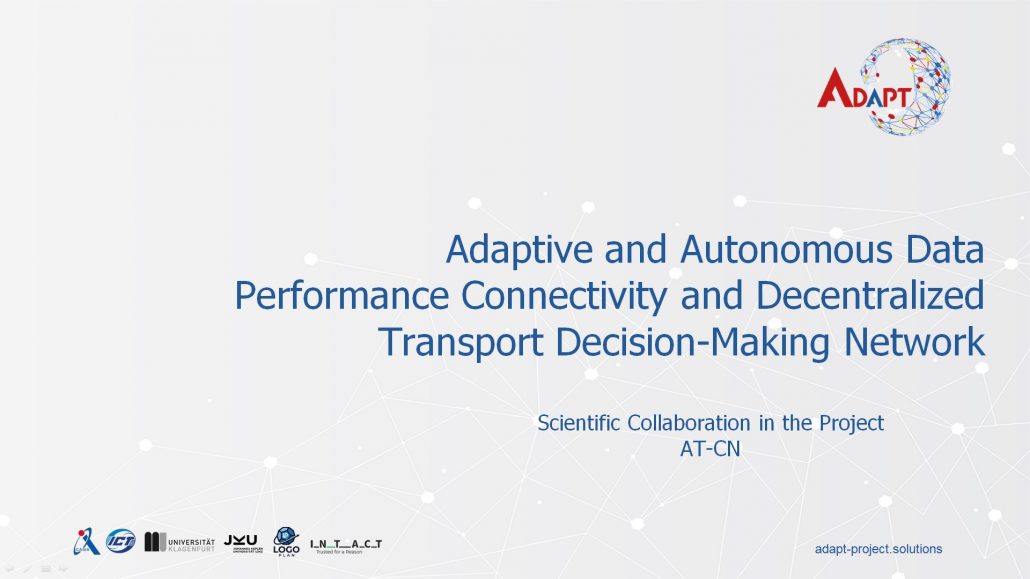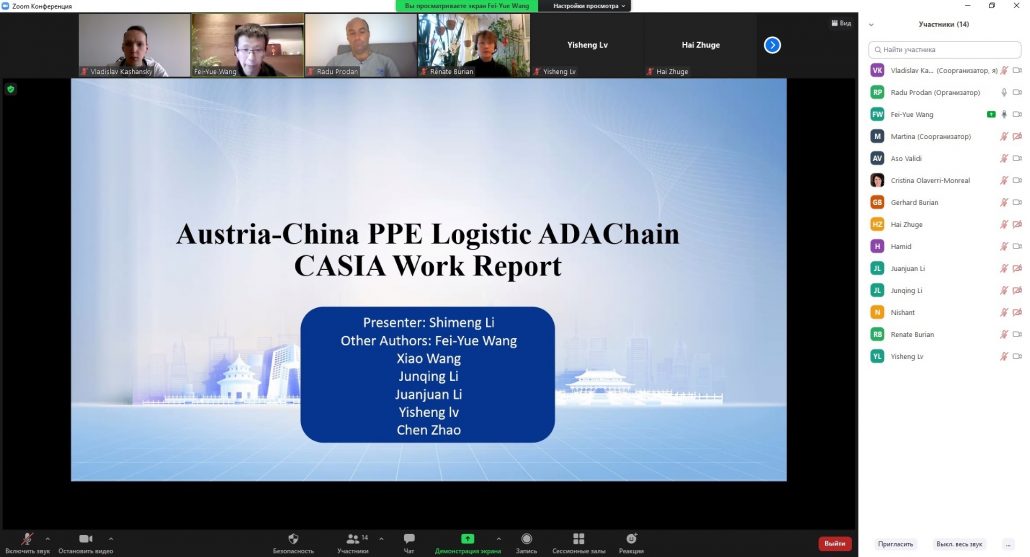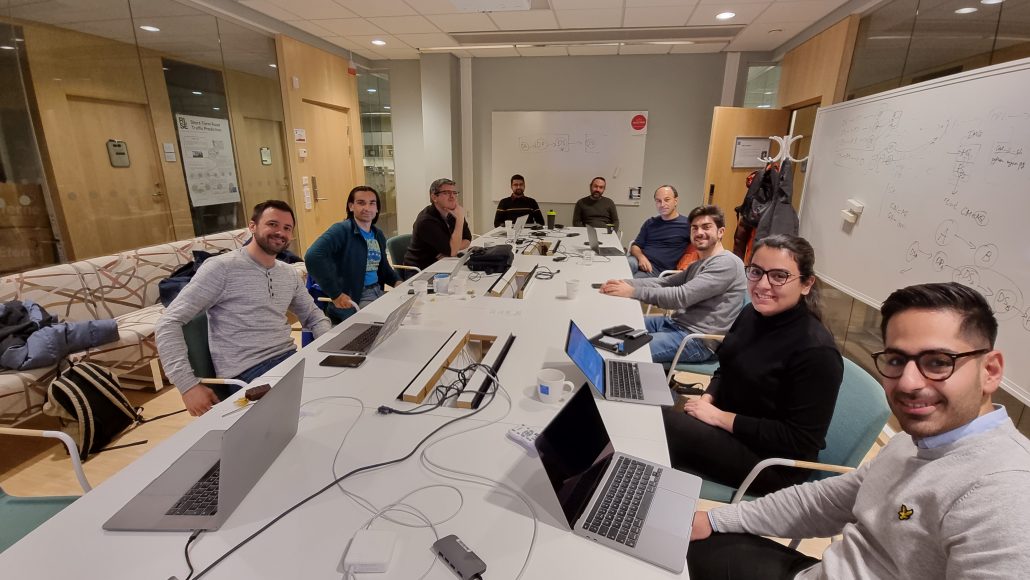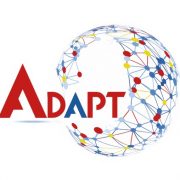Second online meeting between Austria and China took place on 21.02.2022. Consortium discussed aspects of sustainable transportation networks, #blockchain and new development strategies in line with #UnitedNations #IYBSSD #SDGs

Distributed and Parallel Systems
Title: Big Data Pipelines on the Computing Continuum: Tapping the Dark Data
Authors: Dumitru Roman, Radu Prodan, Nikolay Nikolov, Ahmet Soylu, Mihhail Matskin, Andrea Marrella, Dragi Kimovski, Brian Elvesæter, Anthony Simonet-Boulogne, Giannis Ledakis, Hui Song, Francesco Leotta, Evgeny Kharlamov
Abstract: Big Data pipelines are essential for leveraging Dark Data, i.e., data collected but not used and turned into value. However, tapping their potential requires going beyond existing approaches and frameworks for Big Data processing. The Computing Continuum enables new opportunities for managing Big Data pipelines concerning efficient management of heterogeneous and untrustworthy resources. This article discusses the Big Data pipelines lifecycle on the Computing Continuum, its associated challenges and outlines a future research agenda in this area.
In Carinthia, researchers find an open test laboratory in the 5G Playground Carinthia, where the possibilities of the new mobile phone technology can be explored. The problem is: 5G enables the fast transmission of large amounts of data, but these also have to be processed. Read the whole interview of Univ.-Prof. DI Dr. Radu Prodan in the latest University Klagenfurt news.
Title: Decentralized Machine Learning for Intelligent Health Care Systems on the Computing Continuum
Authors: Dragi Kimovski, Sasko Ristov, Radu Prodan
Abstract: The introduction of electronic personal health records (EHR) enables nationwide information exchange and curation among different health care systems. However, the current EHR systems do not provide transparent means for diagnosis support, medical research, or can utilize the omnipresent data produced by the personal medical devices. Besides, the EHR systems are centrally orchestrated, which could potentially lead to a single point of failure. Therefore, in this article, we explore novel approaches for decentralizing machine learning over distributed ledgers to create intelligent EHR systems that can utilize information from personal medical devices for improved knowledge extraction. Consequently, we proposed and evaluated a conceptual EHR to enable anonymous predictive analysis across multiple medical institutions. The evaluation results indicate that the decentralized EHR can be deployed over the computing continuum with reduced machine learning time of up to 60% and consensus latency of below 8 seconds.
Alexander Lercher’s Master Thesis titled ‘Context-aware Community Evolution Prediction in Distributed Social Networks‘ under the supervision of Prof. Radu Prodan at ITEC has been awarded outstanding academic thesis and a grant of 600 Euros in the field of digitization for Master’s Category. This work received funding from European Union’s Horizon 2020 research and innovation programme, grant agreement 825134, “Smart Social Media Ecosystem in a Blockchain Federated Environment (ARTICONF)”. The award ceremony will take place on Wednesday, November 24th, 2021 at 11 a.m. in the mirror hall of the Carinthian Provincial Government.
 DataCloud project partners met at KTH Kista (Stockholm) to discuss the domain-specific language and the architecture for specifying and running Big Data pipelines.
DataCloud project partners met at KTH Kista (Stockholm) to discuss the domain-specific language and the architecture for specifying and running Big Data pipelines.
https://twitter.com/RaduProdanAAU/status/1461352859920785418/photo/1
Title: Autotuning of exascale applications with anomalies detection
Authors: Dragi Kimovski, Roland Mathá, Gabriel Iuhasz, Fabrizio Marozzo, Dana Petcu, Radu Prodan
Abstract: The execution of complex distributed applications in exascale systems faces many challenges, as it involves empirical evaluation of countless code variations and application run-time parameters over a heterogeneous set of resources. To mitigate these challenges, the research field of autotuning has gained momentum. The autotuning automates identifying the most desirable application implementation in terms of code variations and run-time parameters. However, the complexity and size of the exascale systems make the autotuning process very difficult, especially considering the number of parameter variations that have to be identified. Therefore, we introduce a novel approach for autotuning of exascale applications based on a genetic multi-objective optimization algorithm integrated within the ASPIDE exascale computing framework. The approach considers multi-dimensional search space with support for pluggable objectives functions, including execution time and energy requirements. Furthermore, the autotuner employs a machine learning-based event detection approach to detect events and anomalies during application execution, such as hardware failures or communication bottlenecks.
Keywords: Exascale computing, Autotuning, Events and Anomalies Detection, Multi-objective Optimisation
Congratulations to Negin Ghamsarian et al., who got their paper “ReCal-Net: Joint Region-Channel-Wise Calibrated Network for Semantic Segmentation in Cataract Surgery Videos” accepted at the International Conference on Neural Information Processing (ICONIP 2021).
Abstract: Semantic segmentation in surgical videos is a prerequisite for a broad range of applications towards improving surgical outcomes and surgical video analysis. However, semantic segmentation in surgical videos involves many challenges. In particular, in cataract surgery, various features of the relevant objects such as blunt edges, color and context variation, reflection, transparency, and motion blur pose a challenge for semantic segmentation. In this paper, we propose a novel convolutional module termed as ReCal module, which can calibrate the feature maps by employing region intra-and-inter-dependencies and channel-region cross-dependencies. This calibration strategy can effectively enhance semantic representation by correlating different representations of the same semantic label, considering a multi-angle local view centering around each pixel. Thus the proposed module can deal with distant visual characteristics of unique objects as well as cross-similarities in the visual characteristics of different objects. Moreover, we propose a novel network architecture based on the proposed module termed as ReCal-Net. Experimental results confirm the superiority of ReCal-Net compared to rival state-of-the-art approaches for all relevant objects in cataract surgery. Moreover, ablation studies reveal the effectiveness of the ReCal module in boosting semantic segmentation accuracy.
On 10 September 2021, ADAPT project was represented at the GOODIT´21 conference in Rome, Italy by Vladislav Kashanskii.
Here you find his presentation about “The ADAPT Project: Adaptive and Autonomous Data Performance Connectivity and Decentralized Transport Decision-Making Network” as pdf and video.
The project “Kärntner Fog” has been accepted in the BRIDGE funding call of FFG.
Abstract: Kärntner Fog aims to contribute with advanced technologies for the distributed optimized provisioning and operation of 5G applications in Austria. For this purpose, it researches and develops a unique infrastructure testbed called the Carinthian Computing Continuum (C3), consisting of heterogeneous Cloud, Fog, and 5G‐Edge devices orchestrated through novel benchmarking, monitoring, analysis, and provisioning services. The project will validate its results using modern virtual reality and smart city use cases in the 5G Playground Carinthia. The results will give companies a competitive technological advantage in exploring 5G‐compliant applications in preparation for the deployment of an Austrian‐wide 5G network by 2025.
Partners:
Alpen-Adria Universität Klagenfurt, ITEC
Project duration: 36 months







